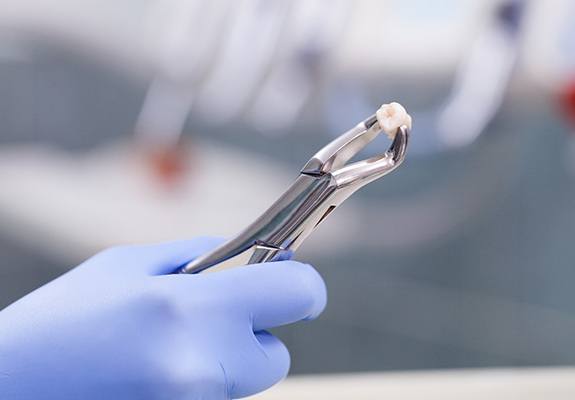Tooth Extractions – Fanwood, NJ
Relieve Your Pain Quickly and Comfortably
Despite what you may have seen in movies and on TV over the years, real-life dentists actually don’t like extracting teeth. Nothing is stronger or better than the teeth you’re born with, which is why our dentists work so hard to help patient’s preserve their natural smiles for as long as possible. Unfortunately, there are some situations in which a tooth can simply be too damaged to be repaired, in which case it should be removed. Thankfully, our team can use their gentle touch and sedation dentistry to ensure a comfortable experience for absolutely every patient.
Why Choose Scotch Plains Fanwood Dental Care for Tooth Extractions?
- Same-Day Appointments Available
- Multiple Types of Sedation
- Patient Comfort is Priority #1
When is a Tooth Extraction Necessary?

Extraction is always our last option because we want to preserve your natural smile. However, our dental team will recommend removing a tooth if:
- It is too decayed to be restored with a filling or crown
- The enamel is broken to the point that it cannot be put back together
- Advanced gum disease has made the bone surrounding the tooth unstable
- More room is needed within the mouth for a new denture/upcoming orthodontic treatment
- A lingering baby tooth is blocking the path of an incoming adult tooth
Another common reason for tooth extractions is infection. An infection inside of your tooth can often spread to the gums, jawbone, and the rest of the body if it’s left untreated. We must extract these heavily infected teeth to prevent more serious issues like bone damage and additional tooth loss from occurring.
The Tooth Extraction Process

During your initial appointment, one of our experts will examine your smile and take x-rays of the affected area to check factors that can’t be seen with the naked eye. Once we have determined that you need a tooth extracted, we will ensure that you’re numb and comfortable before starting. We also offer various sedation dentistry options to help keep you calm and relaxed during the procedure. After the affected area has been prepared and your mouth is numb, we will use a special dental instrument to smoothly rock your tooth back and forth to extract it. The result is a comfortable, easy procedure.
Extraction Recovery & Aftercare

To make your recovery go as smoothly and comfortably as possible, we’ve included some easy yet helpful aftercare tips for extractions:
- Take the pain medication we give you as described.
- Use gauze pads to promote clotting and reduce bleeding. Be sure to always replace your gauze once it’s soaked in blood, or after every 3 to 4 hours.
- Give yourself at least 2 days to relax after your extraction. Typically, we can schedule planned extractions on a Friday so you can have the weekend to take it easy.
- Use a cold compress or ice pack to reduce swelling but alternate it on and off of your face for 10 minutes each session.
- Avoid using a straw for the first 24 hours.
- Avoid smoking or the use of tobacco.
- Prop your head up while laying down.
- Continue your brushing and flossing routine but avoid the extraction site.
Tooth Extraction FAQs

Be sure to ask as many questions as possible when it comes to tooth extraction. The decision to remove the tooth is one you should only make when you feel fully informed about the situation and what you can expect to happen during the process. These are just some of the questions that we regularly hear from our patients; we invite you to contact our office directly if the information you want isn’t provided here.
What is the Difference Between Tooth Extractions and Wisdom Tooth Surgery?
A normal tooth extraction and a wisdom tooth extraction might seem similar on the surface, but there are a few key differences. First, wisdom tooth extraction is specifically reserved for the third molars that attempt to erupt around early adulthood, while tooth extractions can be performed for any tooth that is beyond repair or is causing oral health issues that can’t be avoided otherwise. There is also the fact that wisdom tooth extraction often calls for surgery since the teeth in question are often impacted underneath the teeth. With normal tooth extractions, as long as the tooth is above the gumline, it can be removed with forceps instead.
Can I Leave the Space Empty After a Tooth Extraction?
When a tooth near the back of the mouth is pulled, some people try to save time and money by simply leaving the space empty. But just because a missing tooth doesn’t change your appearance doesn’t mean it wasn’t important; you need all of your teeth for your mouth to function correctly. One missing tooth can prevent you from chewing properly (especially if the tooth in question was one of your first or second molars). It can also throw off the movements of your tongue and make pronouncing certain words more difficult. We recommend that you schedule an appointment with us to discuss replacement options as soon as your mouth is done healing.
How Should I Prepare for Tooth Extraction?
The instructions you get will vary depending on what type of sedation is used, how complex the extraction process is expected to be, and any additional treatments that might be performed on the same day. We’ll give you instructions while planning the procedure, but we also encourage you to ask any questions you might have about what you should bring and what you can eat beforehand. One rule of thumb that you should keep in mind is that if general anesthesia is going to be used, you should arrange to have another adult drive you home afterwards.
Are There Risks Involved with Tooth Extraction?
A tooth extraction is an extremely safe procedure that is routinely performed by general dentists. Of course, there isn’t a single dental treatment that doesn’t come with at least a small amount of risk. The biggest concern is infection, which can occur if bacteria enter the wound at the extraction site before it’s finished healing. On a related note, failure to protect the extraction site can result in a painful dry socket that impedes the healing process. These potential complications are precisely why following the aftercare instructions we give you is so important.
I Need a Checkup & Cleaning I Have a Broken or Chipped Tooth I Want a Straighter Smile I am Looking for a Dentist for My Child I Want to Improve My Smile I am in Pain & Need Help I am Missing One or More Teeth I am Nervous/Afraid of the Dentist I Need My Wisdom Teeth Removed View Our Services
